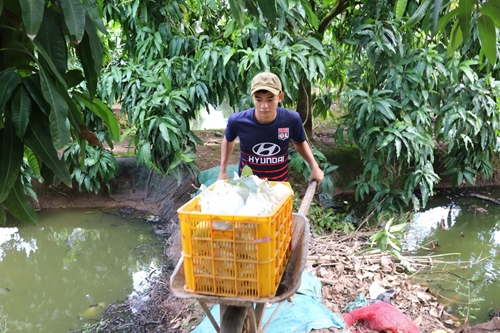Mango boasts huge export potential
Tien Giang cultivates over 3,300 hectares of mango orchards that yield more than 50,000 tons annually, serving not only domestic consumption but also export to China, the Republic of Korea, Japan, the US, and Europe.
The province embraces advanced scientific and technical methods, with nearly half of its mango plantations meeting VietGAP standards, and 57 registered growing areas spanning some 1,800 hectares. Notably, the renowned Hoa Loc mango variety alone covers over 52 hectares under certified cultivation.
    |
 |
|
Harvesting Cat Chu mangoes in Cao Lanh, Dong Thap province |
Efforts to boost trade have seen Tien Giang partner with national flag carrier Vietnam Airlines since 2019, featuring Hoa Loc mangoes on flights, which promotes the fruit’s brand and strengthens the local production-to-market value chain. Apart from the US, Hoa Loc mango has been present in France, Canada, Australia, Japan, Singapore, China’s Taiwan, and China.
Dong Thap province cultivates Hoa Loc, cat Chu, and green-skinned tuong mangoes over an area of nearly 14,000 hectares, producing more than 185,000 tons each year. Of this harvest, 28% is consumed domestically, while 70% is exported through unofficial channels, and 5-7% through official routes.
To meet stringent export requirements, the province has developed over 8,200 hectares of registered cultivation zones with 296 codes, established nine registered packaging facilities, and presented certifications to 33 organizations and individuals who plant 353 hectares of mango under the VietGAP standard.
The Ministry of Science and Technology’s Intellectual Property Development Program, launched in 2022 and running to 2030, features specific provisions for managing and developing the "Cao Lanh" geographical indication for Dong Thap's mango products in tandem with controlling quality and planting area code in service of export. The establishment of geographical indication protection for Cao Lanh mangoes has enabled producers to break into modern distribution channels, including Co.opmart, Big C, MM Mega Market, and Vinmart, while commanding premium prices that reflect the fruit's protected status and verified quality.
Beyond traditional wholesale markets, Dong Thap mangoes have successfully accessed diverse market channels, reaching processing facilities, modern domestic distribution networks, and international markets spanning the European Union, the US, Russia, Canada, Australia, New Zealand, Japan, China, and the Republic of Korea, while also establishing a strong presence in digital commerce platforms like Voso, Postmart, Lazada, and Shopee, expanding the staple’s global presence.
Building brands for a local staple
To enhance the value chain of speciality fruit commodities with its competitive advantages, Tien Giang province is operating the Hoa Loc mango production–consumption chain project for 2020-2025 with a vision towards 2030. The province’s agricultural sector has guided farmers, cooperatives, production groups, and export enterprises on traceability, VietGAP and GlobalGAP standard cultivation to ensure food safety and quality.
Vice Chairman of the provincial People’s Committee Pham Van Trong said that to increase mango exports to foreign markets, production facilities must develop value chains, while localities, producers, cooperatives, packaging facilities and exporters should be informed about market difficulties, obstacles, and technical barriers. Additionally, it is necessary to provide support for mango cultivation areas as well as enterprises to enhance compliance capacity, develop the value chain, increase added value, and meet the requirements of fastidious markets.
In Dong Thap province, the Department of Agriculture and Environment is promoting cooperative linkage models to mitigate the risks of price drops caused by concentrated seasonal production. Local farmers are cultivating their orchards by VietGAP, GlobalGAP, and organic standards, while also adopting new technologies to enhance mango quality and reduce price.
President of the Dong Thap Mango Industry Association Vo Thanh Tuan noted that the province is famous for its mango-based processed products, such as dried mango, mango cakes, mango rice paper, mango wine, mango candies and mango ice cream. Many of these have achieved 3- to 4-star OCOP (One Commune One Product) certification.
Insiders have stated that for mangoes from these two localities, as well as others in the Mekong Delta Region, to maintain official access to high-end markets, farmers must adhere to international technical standards. Furthermore, the agricultural sector needs to assist enterprises, organizations, and farmers in creating stable raw material areas and developing sustainable value chains to enhance export opportunities.
Source: VNA